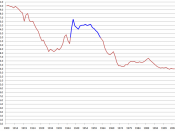In order to clearly distinguish social change throughout the decades, social scientists have created labels for specific age group generations. These generations are: baby boomers, baby busters, echo boomers, and millennium kids. In this paper I will present three generalized traits and/or experiences for each of these generations. The purpose of this essay is to inform the reader of the characteristics and lifestyles of each of these four generations.
Baby boomers presently make up the lion's share of the political, cultural, industrial and academic leadership class in the United States. Bill Clinton and George W. Bush, born within sixty days of each other in mid-1946, are the first and second Baby Boomer presidents. Boomers have played a strong role in attempts to make America more overtly religious. According to Wayde Clark Roof, "the boundaries of popular religious communities are now being redrawn, encouraged by the quests of the large, post-World War II generations, and facilitated by the rise of an expanded spiritual marketplace."
In saying this Roof feels that Baby Boomers are implementing their religious beliefs upon modern society. David Lereah the National Association of Realtors (NAF) chief economist, said, at a press conference in washington: "As a group, boomers are in their peak earning years and continue to wield great influence in the U.S. economy"
Baby busters, also known as 'Generation X-er's, had much more difficult problems accumulating wealth than their predecessors. Americans in their 20s and early 30s-the so-called X Generation-have been stereotyped in the media as kids in low paying jobs constantly bemoaning the fact that the American Dream of their baby boomer parents will elude them. "While this portrait of today's generation is more caricature than real, it is true those 20- and 30-somethings face tougher financial challenges than the preceding generation." (Chomsky, 1999.) Another...


